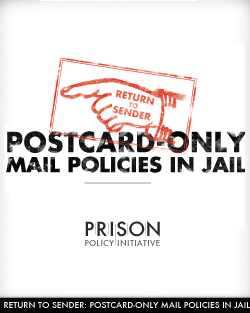Return to Sender: Postcard-only Mail Policies in Jails
by Leah Sakala
When I first started
writing our incarcerated brothers and sisters as a part of our Prison/ Jail
Ministry here at Mercy, I ran into a lot of hurdles in regards to the
individual policies at each facility. The seemingly simple act of writing
people turned into tedious production, trying to learn the numerous polices
of the handful of jails we have here in Atlanta.The firs few weeks of our letter writing campaign at Mercy can be summarized with following three words "Return To Sender." Leah Sakala has done a great job
taking a closer look at the national trend of banning letters and moving solely
to postcards.
 February 7, 2013
February 7, 2013
1. Introduction
"Over the past five years, dozens of local jails across the country have followed a harmful new policy trend: mandating that all personal written correspondence to or from jail take place via postcard. The postcard-only trend began in 2007, when controversial Maricopa County Sheriff Joe Arpaio instituted a ban on any incoming non-legal mail except for postcards.[1] Since then, sheriffs from jails in at least 13 states around the country—Arizona, California, Colorado, Florida, Georgia, Kentucky, Kansas, Michigan, Missouri, Oregon, Tennessee, Utah, and Washington—have followed suit by implementing their own postcard-only restrictions on incoming and outgoing mail, radically restricting incarcerated people’s ability to communicate with the outside world. Although several jails that implemented postcard-only policies have since rescinded or relaxed their regulations in response to public pressure and litigation, dozens of postcard-only policies still stand, and more are introduced each year.Postcard-only mail policies are ostensibly crafted to save funds by streamlining the mail screening process and limiting opportunities to introduce contraband into correctional facilities. In practice, they have the perverse effect of deterring written communication between incarcerated people and their communities,[2] straining connections that are essential for both successful reintegration and for preventing reoffending. Social science research has repeatedly documented the significant social and economic value of preserving the community and family support systems that keep formerly incarcerated people from returning to jail. Postcard-only policies run contrary to prevailing correctional standards and best practices, and the vast majority of jail facilities around the country, as well as all other kinds of detention facilities, successfully implement mail security measures without imposing dramatic postcard-only restrictions."
To read this article in its entirety and find addition information on Criminal Justice Policy, head over to http://www.prisonpolicy.org/postcards/report.html.

